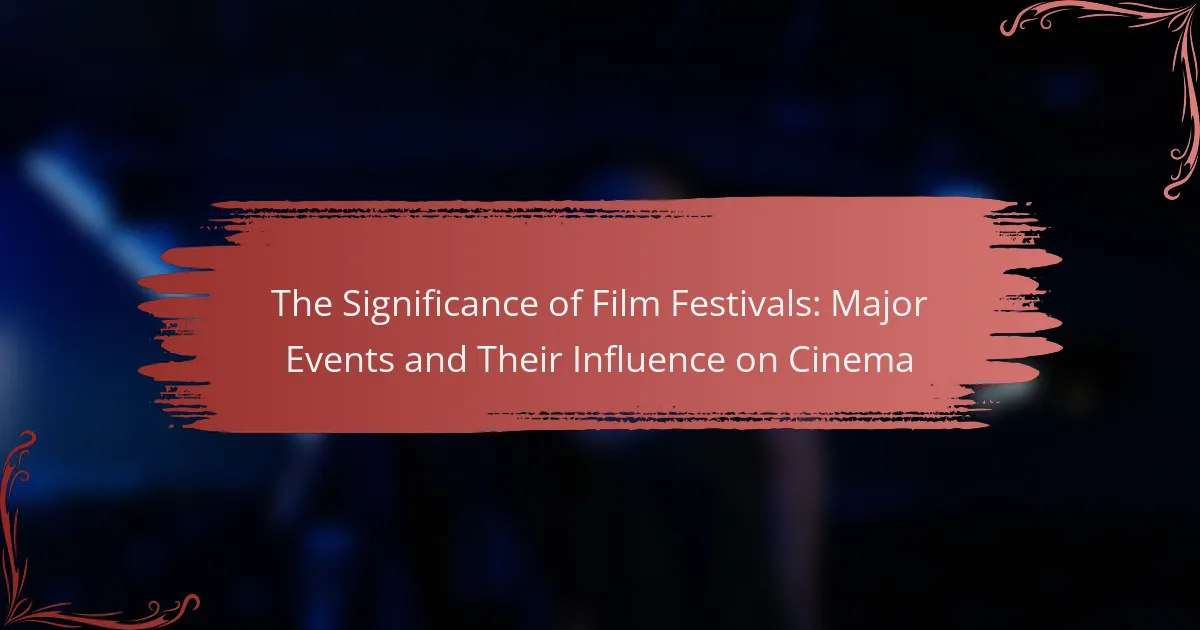Film festivals are significant events in the cinematic landscape, providing essential platforms for filmmakers to showcase independent and international films that often lack mainstream distribution. Major festivals such as Cannes, Sundance, Berlinale, Venice, and TIFF play crucial roles in promoting diverse cinematic art and facilitating networking opportunities for industry professionals. These festivals enhance audience engagement through discussions, premieres, and awards, fostering a deeper appreciation for various genres and styles. Research indicates that attendance at film festivals can increase viewership of independent films significantly, highlighting their influence on shaping cinematic tastes and trends. The article explores the importance of these festivals and their impact on the future of cinema.

What is the significance of film festivals in the cinematic landscape?
Film festivals play a crucial role in the cinematic landscape. They serve as platforms for filmmakers to showcase their work to a diverse audience. These events promote independent and international films that may not receive mainstream distribution. Film festivals often facilitate networking opportunities for industry professionals. They can lead to distribution deals and increased visibility for filmmakers. Awards presented at festivals can enhance a film’s reputation and attract attention. Major festivals like Cannes and Sundance have historically launched successful careers. The significance of film festivals lies in their ability to influence trends and shape the future of cinema.
How do film festivals contribute to the development of cinema?
Film festivals contribute to the development of cinema by showcasing diverse films and fostering industry connections. They provide a platform for emerging filmmakers to present their work. This exposure can lead to distribution deals and funding opportunities. Festivals often highlight innovative storytelling and new cinematic techniques. They also promote cultural exchange by featuring international films. Events like Cannes and Sundance have launched many successful careers. The competitive nature of festivals encourages filmmakers to elevate their craft. Audience feedback at festivals can influence future projects and trends in cinema.
What role do film festivals play in showcasing new talent?
Film festivals play a crucial role in showcasing new talent. They provide a platform for emerging filmmakers to present their work. These events often feature competitions specifically for first-time directors and independent films. Film festivals attract industry professionals, including producers, agents, and distributors. This exposure can lead to opportunities for new filmmakers to secure funding or distribution deals. Additionally, festivals facilitate networking among creators and industry insiders. They also help audiences discover innovative storytelling and diverse voices in cinema. According to a study by the University of Southern California, many successful filmmakers credit film festivals as pivotal in launching their careers.
How do festivals influence film distribution and marketing?
Film festivals significantly influence film distribution and marketing. They serve as platforms for filmmakers to showcase their work to industry professionals and audiences. Festivals often attract distributors looking for new content. Successful screenings can lead to distribution deals for films. Marketing strategies are often tailored around festival participation. Films that perform well at festivals gain visibility and credibility. Awards and accolades from festivals enhance a film’s marketability. For example, the Sundance Film Festival has a history of launching independent films into mainstream success.
Why are major film festivals considered prestigious?
Major film festivals are considered prestigious due to their influence on the film industry and their role in showcasing exceptional talent. They attract high-profile filmmakers, actors, and industry professionals. The selection process for films is often rigorous, highlighting only the best works. Festivals like Cannes and Sundance have a history of launching successful careers. Winning awards at these festivals can significantly enhance a film’s visibility and marketability. Moreover, they provide a platform for diverse voices and innovative storytelling. This combination of quality, recognition, and opportunity contributes to their esteemed reputation.
What criteria define a major film festival?
A major film festival is defined by its international recognition, scale, and impact on the film industry. These festivals typically showcase a wide range of films, including feature-length, short films, and documentaries. They attract significant media attention and industry professionals, including filmmakers, critics, and distributors. Major film festivals often have competitive sections, awarding prestigious prizes for various categories. They also provide networking opportunities for filmmakers and promote cultural exchange through diverse programming. Examples of major film festivals include Cannes, Sundance, and Berlin, which have established a reputation over decades. These festivals play a crucial role in launching films and careers in the global cinema landscape.
How do awards from these festivals impact filmmakers’ careers?
Awards from film festivals significantly enhance filmmakers’ careers. Winning or being nominated for awards increases visibility within the industry. This recognition often leads to more funding opportunities for future projects. Filmmakers can attract attention from distributors and producers looking for new talent. Awards also validate a filmmaker’s work, boosting their reputation. According to a study by the University of Southern California, films that win major festival awards often see increased box office performance. Additionally, awards can open doors to international markets and collaborations. Overall, festival awards can be pivotal in shaping a filmmaker’s trajectory in the competitive film industry.

What are some of the most notable film festivals around the world?
Cannes Film Festival is one of the most notable film festivals worldwide. It takes place annually in France. Established in 1946, it showcases international films. The festival awards the prestigious Palme d’Or. Sundance Film Festival is another significant event. Located in Utah, it focuses on independent films. Founded in 1978, it has gained global recognition. Berlin International Film Festival, also known as Berlinale, is highly regarded. It occurs every February in Germany. The festival awards the Golden Bear for best film. Venice Film Festival is the oldest film festival. It began in 1932 and is held in Italy. The Golden Lion is its top honor. Toronto International Film Festival (TIFF) is influential in North America. It takes place each September in Canada. TIFF is known for premiering award-winning films. These festivals significantly impact the film industry. They provide platforms for filmmakers and promote cinematic art.
How do different festivals specialize in various genres or themes?
Different festivals specialize in various genres or themes by curating films that align with specific artistic, cultural, or social focuses. For instance, Sundance Film Festival emphasizes independent films and emerging filmmakers. Cannes Film Festival showcases high-profile international films, often emphasizing artistic merit and innovation.
Additionally, festivals like Toronto International Film Festival highlight diverse narratives and global cinema. Genre-specific festivals, such as the Horror Film Festival, exclusively feature horror films, catering to niche audiences.
These specialization strategies attract targeted audiences and industry professionals, enhancing networking opportunities and promoting genre-specific discussions. The distinct themes and genres also reflect cultural trends and societal issues relevant at the time of the festival.
What are the unique features of the Cannes Film Festival?
The Cannes Film Festival is renowned for its prestigious awards and glamorous atmosphere. It features the Palme d’Or, one of the most coveted film awards globally. The festival showcases a diverse range of films, including international cinema and independent productions. It attracts high-profile celebrities, enhancing its allure and media coverage. The event takes place annually in May, drawing significant attention from filmmakers and audiences alike. Cannes emphasizes artistic merit and innovation in filmmaking. The festival also serves as a marketplace for film distribution, facilitating deals between producers and distributors. Additionally, it promotes networking opportunities among industry professionals.
How does Sundance Film Festival support independent filmmakers?
The Sundance Film Festival supports independent filmmakers through funding, exposure, and networking opportunities. It offers grants and fellowships to help finance projects. The festival showcases independent films, providing a platform for creators to reach audiences. Sundance also hosts panels and workshops that educate filmmakers on industry trends. The event attracts industry professionals, facilitating connections for future collaborations. In 2020, Sundance featured over 120 films, highlighting diverse voices in cinema. This exposure can lead to distribution deals and increased visibility for filmmakers. Overall, Sundance plays a crucial role in advancing independent cinema.
What trends can be observed in film festivals today?
Film festivals today showcase several notable trends. One significant trend is the increasing focus on diversity and inclusion. Many festivals are prioritizing films by underrepresented creators. This includes women, people of color, and [censured] filmmakers.
Another trend is the rise of virtual and hybrid formats. The COVID-19 pandemic accelerated the adoption of online screenings. This allows broader accessibility for global audiences.
Sustainability is also becoming a key focus. Festivals are implementing eco-friendly practices. This includes reducing waste and promoting sustainable transportation.
Additionally, there is a growing emphasis on social issues. Many films address topics like climate change and social justice. This aligns with audience interests and current global conversations.
Technological advancements are influencing festival experiences. Augmented reality and virtual reality are being integrated into presentations. This enhances audience engagement and interaction.
Overall, these trends reflect evolving audience expectations and industry dynamics. They highlight the film festival’s role in shaping contemporary cinema.
How have virtual film festivals changed the landscape?
Virtual film festivals have significantly transformed the film festival landscape. They have increased accessibility for audiences worldwide. Viewers can now attend screenings without geographical limitations. This shift has broadened the audience base for filmmakers. Additionally, virtual festivals often have lower entry fees for filmmakers. This change encourages more diverse submissions. The integration of technology has enhanced viewer engagement through interactive features. Statistics show a rise in attendance numbers compared to traditional festivals. For instance, the 2021 Sundance Film Festival reported over 100,000 viewers online. This trend indicates a lasting impact on how films are showcased and consumed.
What is the impact of social media on film festival visibility?
Social media significantly enhances film festival visibility. It allows festivals to reach broader audiences instantly. Platforms like Twitter, Instagram, and Facebook enable real-time updates and engagement. Festivals can share trailers, interviews, and behind-the-scenes content. This content attracts potential attendees and industry professionals alike. Studies show that festivals with active social media presence see increased ticket sales. For example, the Sundance Film Festival reported a 20% rise in attendance due to social media promotion. Additionally, films showcased at festivals gain more traction online, leading to better distribution opportunities. Thus, social media plays a crucial role in amplifying film festival visibility and success.

How do film festivals influence audience engagement with cinema?
Film festivals significantly enhance audience engagement with cinema. They provide a platform for diverse films that may not reach mainstream distribution. This exposure fosters a deeper appreciation for various genres and styles. Audiences often participate in discussions and Q&A sessions with filmmakers. Such interactions create a sense of community and investment in the films presented. Festivals also generate excitement through premieres and awards, motivating audiences to attend. According to a study by the University of Southern California, film festivals increase viewership of independent films by 50% among attendees. This data underscores the festivals’ role in shaping cinematic tastes and preferences.
What experiences do film festivals offer to attendees?
Film festivals offer a diverse range of experiences to attendees. They provide access to a curated selection of films, showcasing both established and emerging filmmakers. Attendees can participate in Q&A sessions with directors and actors, fostering direct engagement with creators. Networking opportunities abound, allowing industry professionals and enthusiasts to connect. Workshops and panels often occur, offering insights into filmmaking and industry trends. Additionally, film festivals create a communal atmosphere where film lovers can share their passion. Many festivals also host awards ceremonies, celebrating artistic achievements. Overall, these experiences enrich attendees’ appreciation of cinema and its cultural significance.
How do panel discussions and Q&A sessions enhance viewer understanding?
Panel discussions and Q&A sessions enhance viewer understanding by providing direct interaction with filmmakers and experts. These formats allow audiences to ask questions and receive immediate responses. This interaction clarifies complex themes presented in films. It also offers insights into the creative process behind the work. Viewers gain deeper context about the film’s subject matter. According to a study by the University of Southern California, audience engagement during Q&A sessions significantly improves comprehension of film narratives. This engagement fosters a richer appreciation of cinematic art.
What role does networking play in audience engagement at festivals?
Networking enhances audience engagement at festivals by fostering connections among attendees, creators, and industry professionals. It allows participants to share experiences and insights, creating a more interactive environment. This interaction increases the likelihood of discussions about films and related topics. Networking also facilitates collaboration opportunities, leading to future projects. Engaged audiences are more likely to participate in Q&A sessions and workshops. Events that encourage networking typically report higher satisfaction rates among attendees. Studies show that networking opportunities can significantly boost repeat attendance at future festivals.
What are the challenges faced by film festivals in the modern era?
Film festivals face several challenges in the modern era. One significant challenge is increased competition from digital streaming platforms. These platforms offer immediate access to films, reducing the audience’s incentive to attend festivals. Additionally, the COVID-19 pandemic has disrupted traditional festival formats. Many festivals had to pivot to virtual or hybrid models, affecting attendance and engagement.
Another challenge is the rising costs associated with organizing festivals. This includes venue rentals, marketing, and logistics, which can strain budgets. Furthermore, securing sponsorships has become more difficult as brands reassess their marketing strategies.
Diversity and representation remain critical challenges as well. Festivals are under pressure to showcase a broader range of voices and stories. Lastly, audience engagement is a concern, as festivals must innovate to attract younger viewers accustomed to on-demand content.
How do economic factors affect festival operations?
Economic factors significantly influence festival operations. Budget constraints determine the scale and scope of events. Higher operational costs can reduce the number of films showcased. Economic downturns may lead to decreased ticket sales and sponsorships. Festivals may adjust ticket pricing based on economic conditions. Funding from local governments often varies with economic performance. Economic stability encourages investment in marketing and promotions. Additionally, fluctuations in currency can impact international participation and attendance. These factors collectively shape the overall success and sustainability of film festivals.
What strategies can festivals employ to remain relevant?
Festivals can remain relevant by embracing innovation and audience engagement. They should adopt digital platforms for virtual attendance, enhancing accessibility. Incorporating diverse programming attracts wider demographics. Collaborating with emerging filmmakers fosters fresh content. Utilizing social media amplifies reach and interaction. Implementing sustainability practices resonates with environmentally conscious attendees. Regularly assessing audience feedback helps tailor future events. These strategies ensure festivals adapt to changing cultural landscapes and maintain significance in the film industry.
What tips can filmmakers consider when submitting to film festivals?
Filmmakers should research each festival’s submission guidelines thoroughly. Each festival has specific requirements regarding film length, genre, and format. Filmmakers must ensure their projects align with these criteria. Tailoring submissions to fit the festival’s theme can enhance chances of acceptance. High-quality visuals and sound are crucial; festivals prioritize technical excellence. A strong synopsis and engaging logline can attract attention from judges. Filmmakers should submit early to avoid last-minute issues. Networking at festivals can provide valuable insights and opportunities for future projects.
The main entity of the article is film festivals, which are significant events in the cinematic landscape. The article outlines the vital role film festivals play in showcasing diverse films, promoting independent cinema, and facilitating networking opportunities for filmmakers. It discusses how festivals influence film distribution and marketing, highlight new talent, and enhance audience engagement through interactive experiences. Additionally, it addresses current trends, challenges faced by festivals, and strategies for filmmakers submitting their work, providing a comprehensive overview of the impact of major film festivals on the future of cinema.
